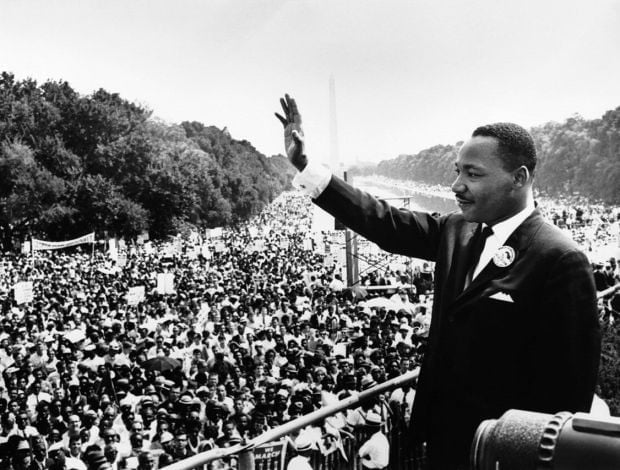While he is now regarded almost universally as a modern-day saint, it took many years before the civil rights leader who believed that “the arc of the moral universe is long, but it bends toward justice” was honored with a national holiday.
With the first efforts starting four days after the Rev. Dr. Martin Luther King Jr. was assassinated in 1968, it took 15 years for supporters to establish a federal holiday commemorating the civil rights leader.
Reverend Martin Luther King, Jr. rose to prominence with his leadership during the Montgomery Bus Boycott in 1955. His message of nonviolence, justice and empowerment, delivered with powerful oration, soon made him the face of the burgeoning Civil Rights movement in America. King would be arrested 30 times for his activities on behalf of disenfranchised African Americans. In the last months of his life, he shifted his attention to fighting poverty.
On April 4, 1968, King was shot and killed on the balcony of the Lorraine Motel in Memphis, Tenn., where he had come to lead a protest of low wages and bad working conditions for sanitation workers.
Four days later, U.S. Representative John Conyers (D-Michigan) became the first person to push for a holiday in King’s honor when he introduced a congressional bill to make a national holiday of King’s birthday, Jan. 15. Conyers would reintroduce the same bill each year for a decade.
The bill first came to a vote in the House of Representatives in 1979, but hit trouble when several Republican congressmen argued that adding another paid day off for federal employees was too expensive, and that “the establishment of a public holiday to honor a private citizen would be contrary to our country’s longstanding tradition.” Rep. Gene Taylor (R-Missouri) said in opposition, “I do not believe our present economic situation will allow us the luxury of another $212 million Federal holiday.” The bill came up five votes short of the two-thirds majority needed for passage.
After the vote, campaigners for the holiday started looking to the general public for support. A petition with six million names was submitted to Congress, and public pressure began to mount. In 1980, Stevie Wonder released a song for the campaign called “Happy Birthday.”
Along with Rep. Shirley Chisholm (D-New York), Conyers continued to submit the bill during each following legislative session. Public pressure grew stronger in 1982 and 1983 with civil rights marches on Washington, D.C.
Finally, in 1983, Congress passed a slightly altered proposal by Rep. Katie Hall (D-Indiana) to honor King with a holiday. The bill went through Congress convincingly: The vote was 338 to 90 in the House of Representatives, and 78 to 22 in the Senate. President Ronald Reagan signed the bill into law in the same year. The holiday was moved from the proposed date of Jan. 15-King’s birthday-to the third Monday in January, which served as a compromise for those who objected that the holiday would be too close to Christmas and New Year’s.
The day was first observed as a federal holiday on Jan. 20, 1986. (It was first observed on a state level in 1973, by Illinois.)
Still, even with federal recognition, the new holiday faced a long struggle for acceptance from the entire country. Some state governments resisted following the federal lead of giving state employees the day off by combining it with other holidays, or giving the day alternate names.
Arizona Governor Evan Mecham rescinded the holiday as his first official act in 1987, saying the previous governor did not have the authority to declare state holidays. The day was still recognized as a holiday in Arizona, but state workers could not receive compensation for the day. This triggered a boycott of the state, culminating in 1990 with the NFL moving the site of the 1993 Super Bowl (planned for Phoenix, Ariz.) to Pasadena, Calif. In 1992, a citizen’s vote brought back the holiday, and in 1996 the Super Bowl was held in Tempe, Ariz.
Several southern states combined the new federal holiday with transparent symbolism. In Mississippi, the holiday is still shared with a celebration of Civil War general Robert E. Lee’s birthday.
For years, state employees in South Carolina were allowed to choose between Martin Luther King Day or one of three different Confederate holidays. In 2000, the state made Martin Luther King Day an official holiday, making it the last state to give all state employees the paid day off.

